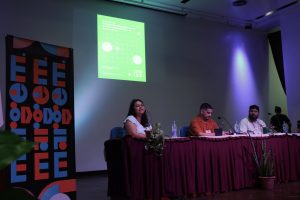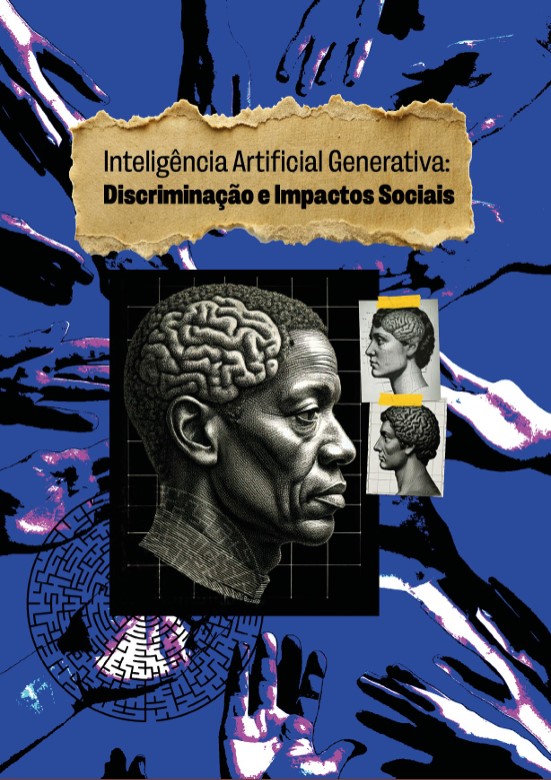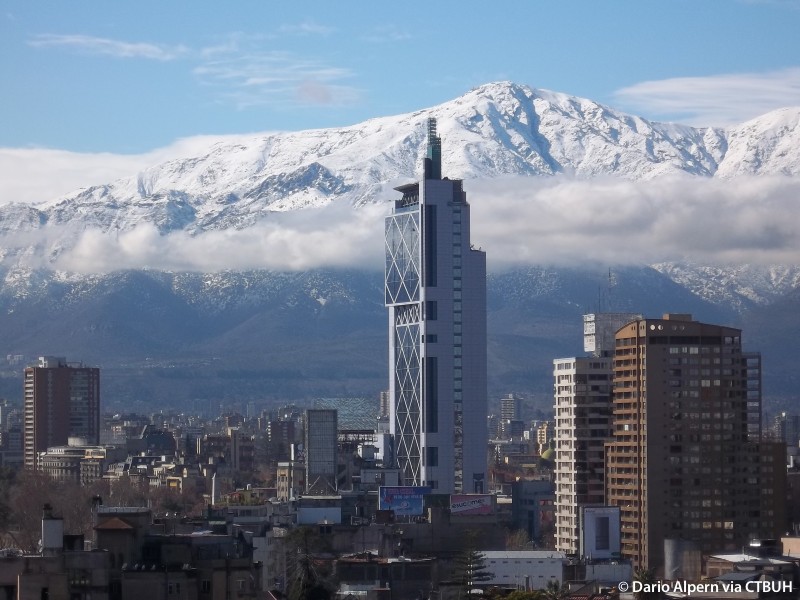The MARGEM Event: The Digital Rights and Environmental Justice Policy Framework for the Amazonia Report Launch
Eco-Midia and CPA Partnership: Internet Health and Amazonia Territorial Governace
We are excited to share that our latest blog post highlights the support from the Mozilla Alumni Connection Grant, backed by the Mozilla Foundation, and the Green Screen Coalition Awards, supported by Ariadne—European Funders for Social Change and Human Rights. We are deeply grateful for the resources, mentorship, and collaboration provided by both philanthropic partners. A special thank you to Maya Richman, Fieke Jansen, and Hailey Froese for believing in the power of resilient technology, infrastructures, and communities of caring. Their unwavering support has been instrumental in advancing our collective work.
Eco-Mídia is Lori Regattieri. And members of CPA are Allan Gomes, Jessica Botelho, Hemanuel Veras, and Keitte.
Over the course of the awards, we achieved significant milestones that highlight the importance of tech justice, data equity, and community-led design. Both awards promoted these values through the partnership between the Eco-media platform and the Grassroots Center for Communication and Audiovisual (CPA), leading to the creation of the MARGEM event and the The Digital Rights and Environmental Justice Policy Framework for the Amazonia Report (you can download here). This event brought together diverse voices to discuss and address the pressing issues of the Amazonia region, emphasizing “territory-based governance”, meaningful connectivity, public interest technology, and information integrity.
Throughout the period of the awards, we facilitated a series of workshops focused on design justice, digital care, and combating climate disinformation in the context of environmental defenders. These workshops were instrumental in shaping the insights and recommendations presented in our “Digital Rights and Environmental Justice Policy Framework for the Amazonia: Insights and Recommendations Report.” The principles of internet health, including technological interoperability, portability, innovation, and decentralized participation, were integral to our approach. We evaluated our success by the level of engagement and participation from community members, activists, and organizations. Our community-based development processes fostered accountability, participation, and trust, ensuring that the voices from the Amazonia region were integral to the digital policy-making process.
Our commitment to working in the open was demonstrated through the inclusive nature of our events and the accessibility of our findings. By organizing panels, workshops, and discussions that were open to the public, we created a collaborative environment where multiple constituencies could contribute to the dialogue on digital rights and environmental justice. The MARGEM event highlighted the need for collective action and efficient strategies to guarantee the territorial sovereignty and self-determination of indigenous peoples, quilombolas, and local communities in the Amazonia. We also had the significant launch of the book “Griots e Tecnologias Digitais” with Tarcizio Silva, a Senior Fellow at Mozilla, and Thiane Neves.
Inspired by Milton Santos’ concepts of environmental justice and abolition, the report addresses critical issues such as privacy, fairness, trust, safety, and transparency in AI systems. The police brief adresses the transformations in our territories involving the complex sociotechnical interdependencies of technological, economic, and social factors. The MARGEM event served as a space for technological liberation from recursive violence and a platform to prototype new systemic reparative justice models open to ecological differences. The “Digital Rights and Environmental Justice Policy Framework for the Amazonia: Insights and Recommendations Report,” a collaborative effort by CPA and the Pan-Amazonia Technopolitics Coalition, underscores the importance of technology that is aware of power dynamics and supports the collective struggles for spatial justice in the Amazonia. It emphasizes the need for transparent community-based development processes that promote accountability, participation, and trust, aligning with the principles of trustworthy AI. This approach ensures that consent is negotiated and people are heared, recognizing dignity for all community members.
The transformative impact of these awards has been in connecting people across the Amazonia and beyond, fostering a shared vision for a more just and equitable digital future. By building these connections and supporting community-led initiatives, we have laid the groundwork for lasting change that empowers and uplifts the voices of those who have been historically marginalized. This award has not only advanced the cause of digital and environmental justice but has also strengthened the bonds within our communities, showing that together, we can create a future where technology serves all people with fairness, transparency, and respect.
From MARGEM, to us: Data Ethics and Spatial Justice present/future
The first Margem event brought together activists and participants from civil society and youth-led organizations based in Manaus, Amazonas, Brazil. The vibrant event had a diversity of organizations actively working on environmental and social issues traditionally disconnected from debates about the internet and technology. This convergence marked a significant shift as it included participants from organizations like Abare, E Nois, Na Cuia, Global Shapers Manaus, OcupaMinArt, Puxirum and other youth-led groups from Manaus. These organizations engaged in discussions on digital sovereignty, the market concentration of Starlink, and other pertinent issues. Government members and civil society organizations were also present, creating a rich environment for exchanging knowledge, sharing experiences, and fostering a deeper understanding of how internet health intersects with local challenges.
One story that best reflects the impact of our work revolves around the transformative discussions that took place at Margem. The event was a platform where local youth activists could voice their concerns about digital sovereignty and the dominance of large tech corporations like Starlink. These discussions were rooted in the daily realities of the participants who experience the effects of digital policies, from privacy concerns to internet connecvitiy challenges. The exchange of ideas between the local organizations and government representatives highlighted the urgent need for more inclusive and equitable digital policies. This collaboration laid the groundwork for a united front against digital extractivism, facial recognition abuses, and the erasure of regional data and narratives.
Disseminating these debates among organizations in the Amazonia is essential for the digital policy organizations to progress in crucial discussions and combat abusive practices. By bridging the gap between environmental and digital issues, the Margem event underscored the interconnectedness of these fields and the importance of comprehensive approaches to internet health. These awards enabled this crucial gathering, fostering a collaborative spirit and empowering local voices in the fight for digital rights. The impact of this event continues to resonate, inspiring further action and advocacy for a more just and equitable digital future for the Amazonia and beyond.
The Digital Rights and Environmental Justice Policy Framework for the Amazonia: Insights and Recommendations Report
What’s next for our project involves continuing to build on the momentum from the first MARGEM event and the “The Digital Rights and Environmental Justice Policy Framework for the Amazonia: Insights and Recommendations Report”, focusing on technological liberation and territorial materiality for climate justice. We aim to deepen our work in monitoring for transparency and accountability, community-based forest monitoring, and participatory mapping of community rights. By integrating orality as a form of data that fulfills territorial rights sensors, we can ensure that the voices of local communities are not only heard but also actively shape policies and practices. This approach will enhance our open data initiatives, traceability in the commodities supply chain, meaningful connectivity, and locally driven autonomous communications.
“The Digital Rights and Environmental Justice Policy Framework for the Amazonia: Insights and Recommendations Report” is the result of a series of dialogues facilitated by the Grassroots Center for Communication and Audiovisual (CPA) during various forums. These discussions, held in collaboration with partners across the Pan-Amazon region, have culminated in this report. The collaborative efforts of CPA and its partner organizations reflect their dedication to participatory governance and enhancing community empowerment in response to digital technologies and the climate crisis.
The report advocates for a multistakeholder from the territory governance model characterized by meaningful and accountable participation. It highlights the necessity for flexible stakeholder roles responsive to the nuances of each issue, particularly addressing the challenges and dynamics of the Amazonia region. It emphasizes the importance of transparency, accountability, inclusivity, and equity, advocating for a bottom-up decision-making process that does not marginalize any stakeholder group at the territorial level. This model supports trustworthy involvement mechanisms, enabling all affected parties to participate in decision-making, with logistics and capacity-building support available as needed.
The Digital Rights and Environmental Justice Policy Framework for the Amazonia: Insights and Recommendations Report is divided into six sections:
1 – From the Territory and Towards Internet Governance
2 – Meaningful Connectivity;
3 – The Right to Communication and Infor- mation;
4 – An Intersectional Agenda for Digital Rights and Climate Justice;
5 – Strengthening Sociobiodiversity
6 – Data, Digitalization, and Automation Systems.
The next steps for this recommendations report, which are already being put into practice, include mobilising organisations from all over the Pan-Amazon Basin so that they can join the document, capillarising the debates on public interest technology and climate justice in various territories and inviting Amazonian organisations to join political articulation for the defence of human and digital rights in the region. The Insights and Recommendations Report has currently been signed by 16 local organisations committed to this mobilisation.
Establishing the Pan-Amazonia Technopolitics Coalition, conveniently launched with this Report, marks the first step toward a new phase of debate and political coordination on technology from the Amazonia territory. Therefore, it does not exhaust the possibilities for collective construction supporting Amazonian digital rights within the context of climate injustice. Instead, it inaugurates and invites collaboration with the Grassroots Center for Communication and Audiovisual (CPA) and the Pan-Amazonia Technopolitics Coalition.
Furthermore, we will continue to participate in important international events such as Rights Con, the ACM Conference on Fairness, Accountability, and Transparency (ACM FAccT 2024), Mozilla Festival, Cupula dos Povos, and the Conference of the Parties COP30 that will take place in Belém, Brasil, in 2025, which will allow us to share our insights and collaborate with other experts.
To read the full document: Policy Brief



